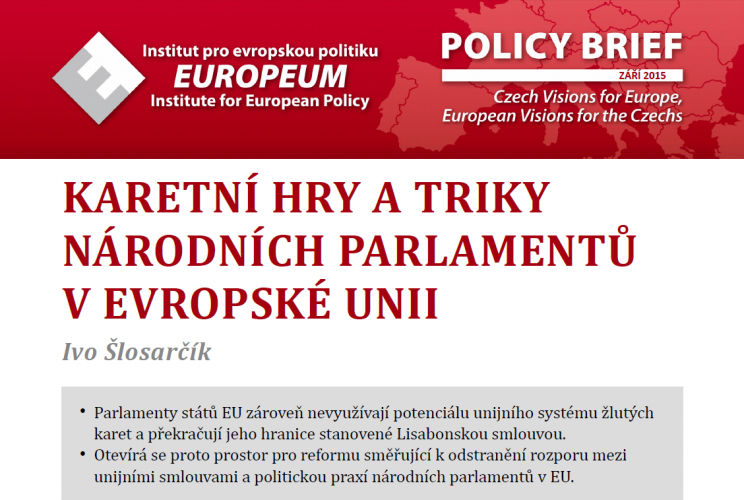Card games and tricks of the national parliaments in the EU
Ivo Šlosarčík's policy brief regarding the card system and its use in the decision-making process of the EU.
- Parliaments of EU member states both fail to exploit the full potential of the yellow-card system and tend to overstep its boundaries, as set by the Lisbon treaty.
- This offers an opportunity for reform, which would remove the contradiction between EU treaties and political practices.
The introduction of the system of yellow, orange and red cards allows national parliaments to directly enter the EU decision-making processes. The card system represents a post-Lisbon mechanism, intended to remedy the earlier weakening of the role of national parliaments through the process of European integration. At the same time, national parliaments were unable to take full advantage of the post-Lisbon yellow card mechanism, due to difficulties in coordinating the activation of the decentralized procedure, and overstepped the limits of the card system due to the scope of their objections. A future reform of the card mechanism might therefore include enhancement of the interparliamentary coordination procedures, a widening and better specification of the range of EU documents succumbed to the card mechanisms, as well as clarifying of the reasons for why they are subjected to the review. Another possibility constitutes introducing a green card, which would encourage the EP to undertake legislative action.
Ivo Šlosarčík
Associate Research Fellow
Associate Research Fellow
Related articles
- Policy Brief | Preparing for EU35+: The View from Central Europe
- Policy Brief | Were Czech industrial policy interests reflected in EU 2024-2029 strategic agenda discussions?
- EUROPEUM Institute's ranking of MEPs' influence
- Policy Brief | Prospects for changes in the composition of the European institutions after the 2024 elections
- BLOG | European Media Freedom Act on the case of Slovenia: Has Slovenia overtaken the European Commission with its new law?
- On the New Pact on Migration and Asylum proposal: Looking for solidarity
- COMMENTARIES: State of the European Union address 2020
- In divided Cyprus, new tensions in decades-old dispute arise while history is made in the European election
- Between moderate progress and prolonged stagnation: The European Commission’s Reports on the Western Balkans
- POLICY PAPER: The European Parliament and climate change: past, present and future
- POLICY PAPER: The Legal Status of Accredited Parliamentary Assistants
- Commentary: European Elections
- ELECTIONS COMMENTARIES: Main topics of the upcoming European Elections
- British politicians made Farage’s 2019 European election campaign easy
- ELECTIONS COMMENTARY: Economic Policies – Czech Party Programmes for the EP 2019 Elections
- Analysis Of the Activity Of the Czech MEPs During the 2014–2019 Term
- IFAT: How Could the European Elections Reshape Central Europe’s Role in the EU?
- ELECTIONS COMMENTARY: Main election topics of the upcoming European Elections
- Three months until Brexit – Are we ready?
- The Czech perspective on the Commission ́s MFF proposal 8 months
- Cyber security and Sovereignty Two levels of digital autonomy
- What is next for Central and Eastern Europe?
- Another successful Spitzenkandidat?
- Can the V4’s Priorities shape “Europe’s Priorities”?
- Is Germany too much for us?
- New MFF – Five Challenges for the Czech Republic
- European Parliament: a potential not fully utilized
- Commentary: The Rome Summit
- The ePrivacy Directive as a Test Case of Better Regulation
- Central Europe and the Refugee Question: Cooperation, not Confrontation
- The Secrets of the Trade Secret Directive
- Federica Mogherini and Her First Year as HRVP
- Elections to the European Parliament and the Constitutional Court of the Czech Republic
- "Five Presidents Report" Review
- Swimming in clean(er) waters. Have the eurozone accession rules changed?
EUROPEUM Institute for European Policy
Staroměstské náměstí 4/1
Prague 1 - Staré Město
110 00
tel.: +420 212 246 552
email: europeum@europeum.org
https://www.europeum.org
Staroměstské náměstí 4/1
Prague 1 - Staré Město
110 00
tel.: +420 212 246 552
email: europeum@europeum.org
https://www.europeum.org

